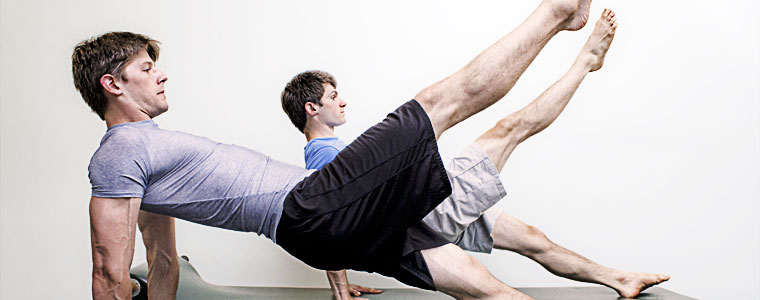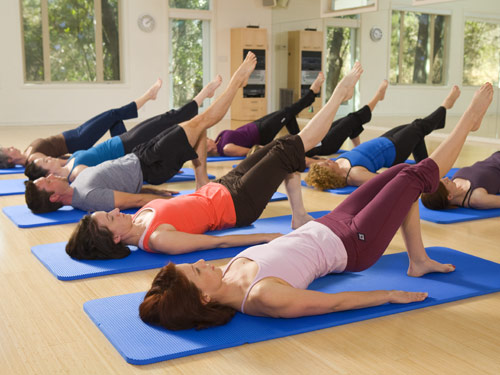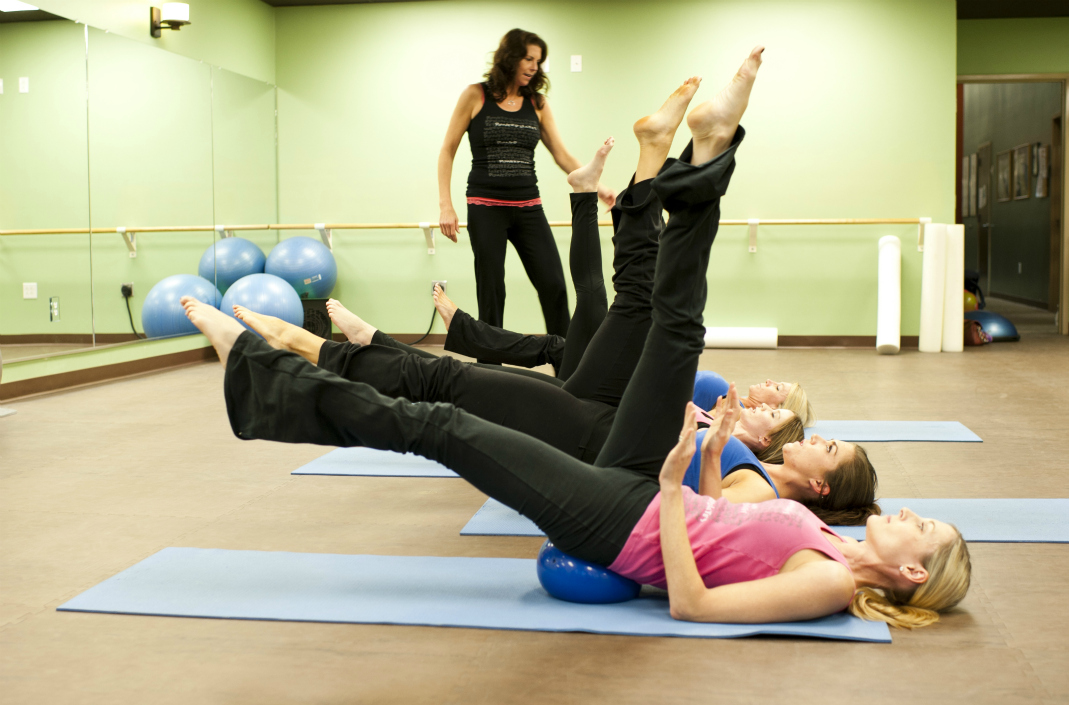Pilates group matwork classes are suitable for those who are looking for a fun group fitness activity. It combines the energy of the group class and yet gives you the personal attention you need as class sizes are small (a maximum of 8 people). These classes are best suited for those who are looking to improve fitness levels and have no special needs (serious injuries, pregnancy etc.)
Benefits of Pilates
Some of the benefits of Pilates are:
- longer, leaner muscles (less bulk, more freedom of movement)
- improves postural problems
- increases core strength, stability and peripheral mobility
- helps prevent injury
- enhances functional fitness, ease of movement
- balances strength & flexibility
- heightens body awareness
- no-impact, easy on the joints
- can be customized to suit everyone from rehab patients to elite athletes
- complements other methods of exercise
- improves performance in sports (golf, skiing, skating etc.)
- improves balance, coordination & circulation
What to expect in your first Pilates class
Your first Pilates class is more a pre-Pilates class. The idea is to introduce you to basic principles of Pilates that you will use throughout your Pilates classes. It is important that basic concepts in Pilates are well understood before we move on to exercises so that the class is more meaningful and you are able to gain maximum benefit from the class.
The basic principles we cover in the first class are related to:
- Breathing
- Pelvic Placement and learning to connect with your deep abdominal muscles
- Rib-cage placement
- Shoulder stability
- Head and neck placement
What is a typical Pilates class like?
The Pilates class is a 45 min session that begins with simple breathing exercises that help us learn how to breathe into our ‘sides’ (the back and the rib cage).
- First few warm up exercises are mobilization for your joints – like knees, back, neck and shoulders- they are mostly done lying supine (on your back)
- We move on to simple abdominal work where you will learn how to engage the correct muscles as you go through the movement
- We slowly progress to prone (lying on the tummy) and seated exercises
- Finally exercises where you are on your hands and knees that require you to stabilize and work through movement with a smaller base of support.
Throughout the class the instructor will encourage you to breathe into your rib-cage and connect with your deep abdominal muscles. The number of repetitions of each exercise are typically 6-12. The focus is on form and executing each movement correctly.

Pilates are for men too!
Do I have to be super flexible and strong to do Pilates?
There seems to be a general feeling that Pilates is only for those who are already fit and strong! The truth couldn’t be further… over the years I have taught people who have never exercised in their life and were attempting it for the first time in their mid 30’s and 40’s to people who have always been fit and are looking for new ways to challenge themselves. The thing about Pilates that I love the most is that it can be modified and exercises made challenging or easy based on need. At Transform Pilates the environment is relaxed and personal and everyone is learning and working on their respective areas of fitness which are different and unique. Can’t get something right after attempting it for the fifth time? no problem we just call it “work in progress” and keep at it!
If I’ve never done Pilates before is there a beginners class?
For those who have never done Pilates before or who may have taken a long break from Pilates and would like to ease back into it we recommend the Pilates Discovery Classes. Pilates Discovery is a basic course designed for people new to Pilates.
Fundamental principles of Pilates are taught and the focus of every session is to use the principles while executing each exercise and to gain better core stability. Each session will progress with additional exercises that will challenge stability and coordination of movements.
Basic props such as flex bands and mini stability balls will be introduced to help with muscle connections or to simplify an exercise.
What happens once I complete the Pilates Discovery classes?
Once you complete your Pilates Discovery classes you will be ready to take on more challenging exercises and move to intermediate level classes. These classes are held through the week and are also 45 minute sessions.
Core Connect, Sculpt & Tone, Fitness Circle Fun, Ball Pilates: These are ongoing classes for clients who are ready for more challenging workouts and have understood and can demonstrate the basic Pilates principles through every exercise. These exercises challenge the core muscles, stability and endurance. Additional props such as fitness circles and toning balls are introduced to progress exercises.
Foam Roller Challenge, Pilates & Barre: These are classes are for the experienced Pilates clients who want to continue to practice Pilates and continuously improve their strength, flexibility and endurance. These exercises are typically more complex in their choreography. The pace of the class is more challenging and exercises move from one to the next seamlessly with props like the foam roller, bosu and large stability balls.
If you are recovering from an injury or have back pain or knee pain
If you have any health concerns you should definitely discuss it with the instructor before the class.
Pilates is a low impact gentle workout that does not have any jarring motions. For this reason it is safe for most existing health conditions like knee injuries, back pain, neck pain or lifestyle ailments like diabetes, thyroid conditions, PCOD etc.
Pilates is a great way to strengthen you back, knees and other joints. It irons out any muscle imbalances that typically lead to overuse of certain muscles over others causing pain.
If your condition does not allow you to do execute certain movements or leaves you with a limited range of motion then exercises can be modified to suit you.
However, you must first get your doctors approval before starting any fitness program.
What do I wear to a Pilates class?

Pilates and men
- DO wear regular exercise clothing like track pants/capris/shorts and t-shirts
- DO wear socks – carry a pair with you. Sport shoes not required.
- DO NOT wear overly loose clothing like salwar-kameez
- Stick to fabrics that allow your skin to breathe and have some element of stretch (lycra/spandex etc.) this will allow you to move your body without any hindrance.
If you have more unanswered questions please refer to the FAQs to know more about Pilates and how you can benefit from it.

